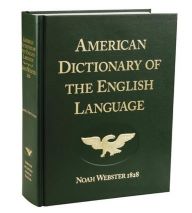Webster’s 1828 Dictionary
In discussing the Declaration of Independence and Constitution with my publisher after considerable study of both documents, we both thought “Maybe we’re missing something. Maybe we’re not really getting the original intent of our Founding Fathers.” My publisher suggested looking in Webster’s 1828 dictionary to see what we could find.
The current publishers of this dictionary state on their web page: “The English language has changed again and again and in many instances has become corrupt.”
What I found surprised me.
Rational and Social Beings
One of the definitions of “Constitution” in this 1828 dictionary is “A system of fundamental principles for the government of rational and social beings.” I had never seen the concept of “rational and social beings” in any definition I had seen in modern dictionaries.
Liberty
I then ran across the definition of “liberty.” I knew it basically meant freedom from something and also a basic right that belongs to people. But look at two of the definitions from Webster’s 1828 dictionary:
“2. Natural liberty, consists in the power of acting as one thinks fit, without any restraint or control, except from the laws of nature. It is a state of exemption from the control of others, and from positive laws and the institutions of social life. This liberty is abridged by the establishment of government.
“3. Civil liberty, is the liberty of men in a state of society, or natural liberty, so far only abridged and restrained, as is necessary and expedient for the safety and interest of the society, state or nation. A restraint of natural liberty, not necessary or expedient for the public, is tyranny or oppression. Civil liberty is an exemption from the arbitrary will of others, which exemption is secured by established laws, which restrain every man from injuring or controlling another. Hence the restraints of law are essential to civil liberty.”
Noah Webster’s Clearly Crafted Definitions
Wow! At that point, I felt cheated in my education. Whole new concepts opened up to me which I had vaguely thought about before, but could never put into words. Noah Webster did put these, and thousands more concepts, into clearly crafted definitions that convey exact and vividly full meanings. I was now a Noah Webster convert, and have gone to his dictionary whenever I felt I may have been cheated by a modern dictionary.
I found that nearly all of the words in our Constitution still have the same basic meanings today as when it was written if one has a “no spin” attitude in reading the Constitution. However, I found that basic concepts expressed in the Declaration of Independence (Life, Liberty, Happiness, government) did have fuller, more exact definitions at the time they were written than are commonly understood today.
In crafting the glossary to my book, I took key concepts from Noah when I felt they aided in a fuller understanding of a word in the Declaration of Independence or the Constitution. Ease of reading was my guiding rule, along with a “spin-free” concept of what these documents actually say. I think Noah would approve of my use of his dictionary and my edits to his own words for the purpose of easing the journey of my readers through these documents.

